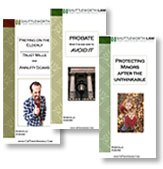How Trustees And Executors Get Into (Or Avoid) Trouble
Here are some of the most common ways trustees and executors get into trouble and risk personal liability to the beneficiaries or creditors of the estate. Call us and arrange for an appointment if you have further questions.
1. Failing to Serve Notice of Irrevocability (Trusts Only): Whenever a trust becomes irrevocable, either in whole or in part, a trustee is required to give notice to all beneficiaries and heirs of the settlor(s) (person/people that created the trust) pursuant to the requirements of Probate Code Section 16061.7. Failure to give notice opens the trustee to liability for damages arising from the failure to provide the notice and, perhaps more importantly, the trust remains contestable (i.e. the trust can be declared invalid) for an extended period of time instead of limiting it to 120 days from the date the notice was mailed.
This can have huge implications. If trust assets are distributed to beneficiaries and the trust is later successfully invalidated resulting in different beneficiaries, the trustee may be personally liable for property distributed to the wrong people. Probate Code §16061.7.
2. Failing to Lodge Will at Court: Within 30 days of death, the custodian of the decedent’s original will must lodge the will at the court in the county where the decedent resided at the time of his or her death and must also mail a copy to the named executor. If the custodian fails to do so, he or she may be held liable for all damages arising from that failure. See Probate Code 8200
3. Failing to Secure / Insure Property: An executor or trustee has the responsibility to collect and secure property so that it may be used to pay the decedent’s creditors or distributed to the decedent’s heirs or estate beneficiaries. Securing property includes insuring property to protect against loss. Failure to do so, accompanied with an insurable loss, can lead to personal liability.
4. Failing to Account: An accounting is a listing of the financial history of the trust or estate being administered. In some ways, it is not unlike a checkbook register. A basic proper accounting will show the beginning balances of all assets, the expenses paid, the distributions made, (i.e. payments to beneficiaries or heirs) and the ending balances of all assets of an estate or trust. Trustees and executors are typically required to account annually, although sometimes it is more often.
Failing to account or not having an account that balances will almost always result in trustee or executor liability. Starting from the beginning, trustees and executors would be well advised to keep very good records to avoid personal liability. See Probate Code §1060 for format and contents of court accountings.
5. Failing to Act Impartially: Trustees and executors must act impartially amongst the beneficiaries of a trust or estate, especially when the trustee or executor is also a beneficiary. Any action taken by a trustee that benefits himself or herself that does not also benefit the beneficiaries is likely to be successfully challenged. See Probate Code §16000 et seq.
6. Failing to Keep Trust and Estate Assets Separate: Trustees and executors must keep trust and estate assets separate from their own. Period. This typically means keeping assets in separate bank accounts that are not mixed with non-trust or non-estate assets.
7. Failing to Generate Income: Trustees and executors generally need to generate income from assets capable of generating income. So, for example, cash assets need to be prudently invested to obtain a reasonable rate of return and real property should be rented, if appropriate, given the goals and circumstances of the administration.
8. Failing to Invest Prudently: The “Prudent Investment” standard typically requires trustees and executors to invest money conservatively and maintain diversity amongst the investments.
NOTE: This website is for general information only. No attorney-client relationship is established by the use of this website and use of this website is strictly conditioned upon the Site User Agreement.



